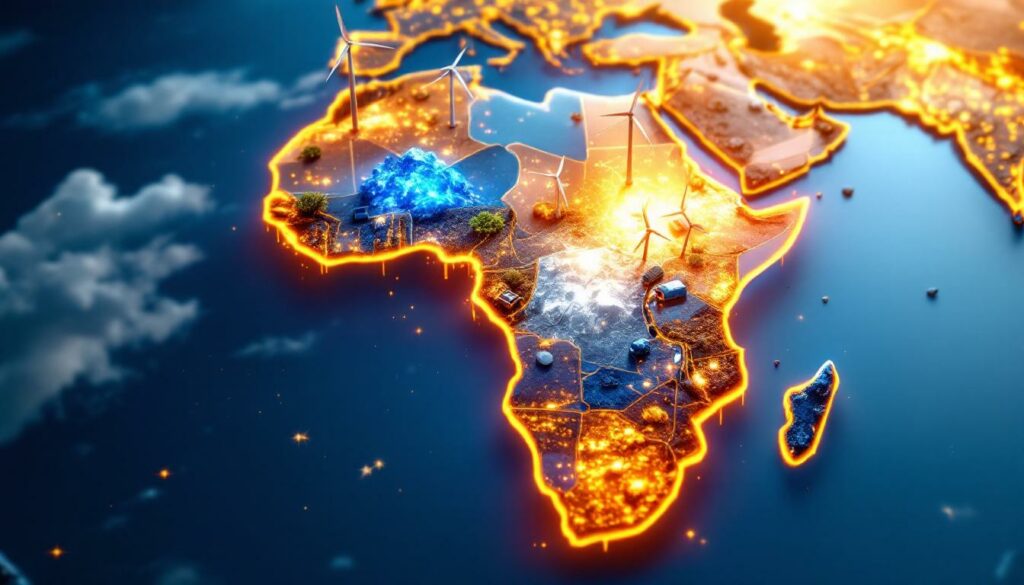Why Are Africa's Critical Minerals Essential for the Global Energy Transition?
Africa possesses vast reserves of critical minerals that are fundamental to the global shift toward renewable energy technologies. These resources position the continent as a potential powerhouse in the clean energy supply chain, despite contributing minimally to global emissions. The continent's mineral wealth represents a unique opportunity to shape the future of energy while addressing local development needs.
Africa's Minimal Carbon Footprint vs. Resource Potential
Africa accounts for less than 4% of global greenhouse gas emissions, making its carbon reduction efforts relatively inconsequential in the global climate change battle. As Samaila Zubairu, President of Africa Finance Corporation (AFC), pointedly noted at the Financing Africa Forward Summit, "Africa doesn't emit enough greenhouse gas to meaningfully impact climate change… We can't stop emissions that we don't make."
This reality creates a compelling argument for Africa to focus on resource development rather than emissions reduction—leveraging its mineral wealth to support global decarbonization while addressing pressing local needs.
Critical Minerals Abundance Across the Continent
The continent hosts substantial deposits of minerals essential for clean energy technologies:
- Cobalt: The Democratic Republic of Congo (DRC) dominates global production, supplying over 70% of the world's global cobalt reserves—critical for electric vehicle batteries and energy storage systems
- Manganese: South Africa, Gabon, and Ghana collectively control significant portions of global manganese reserves, essential for steel production and battery technologies
- Platinum group metals: South Africa holds approximately 80% of global platinum reserves, crucial for hydrogen fuel cells and pollution control technologies
- Graphite: Mozambique and Tanzania host world-class graphite deposits needed for battery anodes and various clean energy applications
- Rare earth elements: Various countries across the continent possess deposits of these critical components for permanent magnets in wind turbines and electric motors
- Copper: Zambia and DRC contain vast copper reserves, vital for electrical infrastructure and renewable energy systems
- Lithium: Zimbabwe and Namibia mining developments are emerging as significant lithium sources for battery technologies
- Nickel: Madagascar and South Africa hold important nickel deposits used in battery cathodes and other clean energy applications
These mineral resources position Africa at the center of the global clean energy transition, creating both opportunities and responsibilities for sustainable development.
How Can Africa Leverage Its Critical Mineral Resources?
Africa's strategic approach to critical minerals development could transform the continent's economic landscape while supporting global climate goals. The key lies in balancing resource extraction with sustainable development priorities and maximizing local value retention.
Prioritizing Development Over Emissions Reduction
Given Africa's minimal carbon footprint, the continent's most significant contribution to global climate action comes not from reducing emissions but from supplying the materials needed for global decarbonization. According to AFC President Samaila Zubairu, Africa should focus "on increasing the supply of critical minerals needed to make the transition, rather than on reducing its own negligible emissions."
This perspective shifts the narrative from one of climate obligation to climate opportunity—positioning Africa as a solution provider rather than a minor contributor to the problem.
Addressing Energy Poverty Through Resource Development
Of the 680 million people globally lacking electricity access, approximately 570 million reside in sub-Saharan Africa. This energy deficit represents one of the region's most significant barriers to economic development and quality of life improvements.
"Access to reliable electricity is fundamental to economic growth, education, healthcare, and overall quality of life. Africa's mineral wealth provides a pathway to address energy poverty while supporting global clean energy transitions."
Strategic development of critical minerals energy security could generate substantial revenue streams that, if properly managed, could fund:
- Expanded electricity access in rural and underserved communities
- Development of domestic renewable energy infrastructure
- Improved healthcare and education services
- Transportation and communication networks to support broader economic growth
The key challenge lies in ensuring resource revenues are directed toward sustainable development priorities rather than being captured by narrow interests or lost to corruption.
What Untapped Energy Potential Exists in Africa?
Beyond critical minerals, Africa possesses substantial untapped energy resources that could transform the continent's development trajectory while complementing its role in the global energy transition.
Hydropower Development Opportunities
Africa has developed only 11% of its potential 340 gigawatts of hydropower capacity. This represents one of the world's largest untapped clean energy resources. Strategic hydropower development could:
- Provide reliable baseload power for industrial development, including mineral processing
- Reduce dependence on imported fuels
- Enable regional power trading through interconnected grids
- Support irrigation and water management systems alongside power generation
Countries with significant undeveloped hydropower potential include the Democratic Republic of Congo, Ethiopia, Cameroon, and Angola. The Grand Inga Dam project in DRC alone could generate up to 40 GW of power—nearly twice the capacity of China's Three Gorges Dam—though financial, technical, and environmental challenges have delayed implementation.
Natural Gas as a Transition Fuel
The continent has vast reserves of undeveloped natural gas that could be utilized for power generation and industrial applications. According to Africa Finance Corporation analysis, if Africa developed all its natural gas resources, global emissions would increase by less than 1%—a minimal climate impact compared to the substantial development benefits.
Natural gas development offers several advantages:
- Reduced local air pollution: Natural gas produces fewer particulate emissions than coal or diesel generation
- Flexible power generation: Gas turbines can ramp up and down quickly to complement variable renewable energy
- Industrial feedstock: Natural gas provides raw materials for fertilizer and other industrial processes
- Export potential: LNG exports can generate foreign exchange earnings to fund development initiatives
Significant natural gas resources exist in Nigeria, Mozambique, Tanzania, Egypt, and Algeria, though development timelines vary widely based on investment climate, infrastructure, and policy frameworks.
Renewable Energy Potential
Beyond hydropower, Africa possesses world-class renewable energy resources:
- Solar energy: The continent receives more hours of bright sunshine than any other continent, with an estimated potential of over 10 TW
- Wind energy: Coastal regions of Morocco, Egypt, South Africa, and East Africa have significant wind resources totaling approximately 180 GW of potential capacity
- Geothermal energy: The East African Rift System offers approximately 15 GW of geothermal potential, with Kenya already establishing itself as a leader in this technology
These renewable resources offer complementary opportunities alongside critical minerals development, potentially powering mineral processing facilities with clean energy and reducing the carbon footprint of resource extraction.
What Challenges Face Africa's Critical Minerals Sector?
Despite the immense potential, several obstacles impede the development of Africa's critical minerals sector, requiring concerted effort from governments, industry, and international partners to overcome.
Infrastructure Deficits
Many mineral-rich regions lack adequate transportation, energy, and processing infrastructure, increasing production costs and limiting export capabilities. Key infrastructure challenges include:
- Transportation networks: Poor road and rail systems increase logistics costs and shipping times
- Port facilities: Limited capacity and efficiency at many ports creates export bottlenecks
- Power supply: Unreliable electricity forces mining operations to use expensive self-generation
- Water infrastructure: Inadequate water management systems impact both operations and communities
- Digital connectivity: Limited telecommunications infrastructure hampers adoption of modern mining industry innovation
These infrastructure gaps not only increase operational costs but also limit the potential for downstream value addition and processing activities that could capture more economic value locally.
Investment Gaps
The capital-intensive nature of mining operations, combined with perceived political risks, has limited investment flows into African mining projects. Key investment challenges include:
- Risk perception: Many investors perceive higher political and operational risks in African jurisdictions
- Capital constraints: Limited local capital markets necessitate foreign investment
- Financing costs: Higher interest rates and risk premiums increase project costs
- Return timelines: Extended periods between initial investment and revenue generation
- Currency risks: Fluctuations in local currencies can impact project economics
Addressing these investment challenges requires both policy reforms to improve investment climates and innovative financing mechanisms to reduce investor risk.
Value Addition Limitations
Most African countries export raw minerals rather than processed materials, missing opportunities for economic value addition and job creation. Factors limiting value addition include:
- Energy constraints: Mineral processing is energy-intensive, requiring reliable, affordable power
- Technical capacity: Limited local expertise in advanced processing technologies
- Scale economies: Small production volumes may not justify local processing facilities
- Market access: Trade barriers can limit market opportunities for processed materials
- Investment incentives: Policy frameworks often fail to encourage downstream investments
The concentration of value addition activities outside Africa means the continent captures only a fraction of the total value of its mineral resources.
Governance Concerns
Resource governance challenges, including corruption and weak regulatory frameworks, have hindered sustainable development of mineral resources in some countries. Governance issues include:
- Regulatory uncertainty: Frequently changing rules create unpredictable investment environments
- Licensing transparency: Opaque allocation of exploration and mining rights
- Revenue management: Inadequate systems for collecting and managing resource revenues
- Environmental oversight: Limited capacity to enforce environmental protection measures
- Community engagement: Insufficient mechanisms for community consultation and benefit-sharing
Addressing these governance challenges is essential for ensuring critical mineral development delivers broad-based benefits while minimizing negative social and environmental impacts.
How Can Africa Maximize Benefits from Critical Minerals?
Strategic approaches could help African nations capture greater value from their critical mineral resources while supporting sustainable development goals and strengthening economic resilience.
Regional Integration and Cooperation
Cross-border collaboration on infrastructure development, resource governance, and processing capabilities could enhance competitiveness and attract investment. Regional approaches offer several advantages:
- Shared infrastructure: Pooled resources for transportation networks and power generation
- Harmonized regulations: Standardized mining codes and environmental standards
- Coordinated marketing: Collective bargaining power in global markets
- Knowledge sharing: Exchange of best practices and technical expertise
- Value chain complementarity: Leveraging comparative advantages across countries
Regional economic communities like the African Continental Free Trade Area (AfCFTA) provide frameworks for such collaboration, though implementation remains a work in progress.
Sustainable Mining Practices
Implementing environmentally and socially responsible mining practices can mitigate negative impacts while ensuring long-term resource viability. Key sustainability approaches include:
- Water management: Closed-loop systems and reduced freshwater consumption
- Energy efficiency: Renewable energy integration and optimized energy use
- Land rehabilitation: Progressive restoration of mined areas
- Biodiversity protection: Conservation offsets and habitat preservation
- Climate resilience: Infrastructure designed for changing climate conditions
These practices not only reduce environmental impacts but can also lower operational costs and improve community relations, creating win-win outcomes for companies and host countries.
Local Content and Skills Development
Investing in education and training programs focused on mining, processing, and manufacturing can build local capacity and maximize economic benefits. Priority areas include:
- Technical education: Mining engineering, geology, metallurgy, and environmental science
- Vocational training: Equipment operation, maintenance, and skilled trades
- Management development: Leadership and business administration skills
- Innovation capacity: Research and development capabilities
- Supply chain development: Support for local businesses to serve mining operations
Building human capital is essential for transitioning from simple extraction to more sophisticated participation in mineral value chains.
Value Chain Development
Establishing domestic processing and manufacturing capabilities for critical minerals could capture additional economic value and create jobs. Strategic approaches include:
- Special economic zones: Dedicated areas with supportive infrastructure and incentives
- Industrial clusters: Concentrations of complementary businesses and suppliers
- Technology transfer: Partnerships with international firms to acquire processing expertise
- Market access agreements: Trade arrangements to support processed exports
- Targeted incentives: Tax benefits for downstream investments
Moving up the value chain requires careful planning and sequenced investments to build competitive advantages over time. Furthermore, creating mineral beneficiation opportunities can significantly boost local economies.
What Role Can International Partners Play?
Global stakeholders have important roles in supporting Africa's critical minerals sector development, creating mutual benefits through strategic partnerships.
Responsible Investment Frameworks
International investors can implement ethical investment approaches that respect local communities, environments, and governance structures. Key principles include:
- Environmental standards: Adherence to international best practices for environmental protection
- Social impact assessment: Comprehensive evaluation and mitigation of community impacts
- Transparent contracting: Clear, publicly disclosed agreements with host governments
- Anti-corruption measures: Robust systems to prevent corrupt practices
- Fair fiscal terms: Equitable sharing of resource revenues
Responsible investment approaches help ensure critical mineral development delivers benefits to host countries while meeting rising global standards for sustainability.
Technology Transfer
Sharing advanced mining and processing technologies can improve efficiency and sustainability in African operations. Effective technology transfer involves:
- Joint ventures: Partnerships that include explicit knowledge sharing provisions
- Research collaboration: Joint R&D initiatives between international and local institutions
- Training programs: Comprehensive skills development for local professionals
- Licensing arrangements: Access to proprietary technologies with fair terms
- Open innovation: Collaborative approaches to solving common industry challenges
Technology transfer enables African operations to leapfrog older, less efficient approaches and adopt leading practices from the outset.
Market Access
Ensuring fair trade terms and market access for African mineral products can help countries realize full economic benefits. Supportive market measures include:
- Reduced tariff barriers: Minimizing import duties on processed African minerals
- Technical assistance: Support for meeting international quality standards and certifications
- Supply chain partnerships: Long-term offtake agreements with fair pricing mechanisms
- Value chain integration: Inclusion of African suppliers in global manufacturing networks
- Preferential sourcing: Corporate commitments to responsible sourcing from African producers
Market access creates economic incentives for investment in production capacity and quality improvements.
Climate Finance
Directing climate finance toward African critical minerals projects acknowledges their contribution to global decarbonization efforts. Relevant financial mechanisms include:
- Green bonds: Debt instruments specifically for sustainable mining and processing projects
- Blended finance: Combining public and private capital to reduce investment risks
- Carbon credits: Recognizing emissions reductions from clean energy use in mining operations
- Transition finance: Funding specifically for projects supporting clean energy supply chains
- Technical assistance grants: Support for environmental and social impact assessments
Climate finance can help bridge investment gaps while ensuring development aligns with global sustainability goals.
What Are the Geopolitical Implications?
Africa's critical minerals are increasingly central to global geopolitical competition and supply chain security concerns, creating both opportunities and challenges for resource-rich countries.
Supply Chain Diversification
As countries seek to reduce dependence on dominant suppliers like China, African sources of critical minerals gain strategic importance. Key dynamics include:
- Resource nationalism: Producer countries leveraging mineral wealth for geopolitical influence
- Strategic stockpiles: Consumer countries building reserves of critical materials
- Friend-shoring: Preferential sourcing from politically aligned countries
- Supply agreements: Long-term contracts to secure access to strategic materials
- Investment screening: Increased scrutiny of foreign investments in critical mineral assets
These diversification efforts create potential leverage for African producers, though they must navigate complex geopolitical currents.
Resource Nationalism Trends
Some African countries are implementing policies to retain greater control and benefits from their mineral resources. Common approaches include:
- Increased state participation: Government equity requirements in mining projects
- Beneficiation requirements: Mandates for local processing of minerals
- Export restrictions: Limitations on raw mineral exports to encourage domestic processing
- Renegotiation of contracts: Revision of terms with existing operators
- Strategic mineral designations: Special regulatory frameworks for critical minerals
While resource nationalism can increase host country benefits, excessive requirements may deter investment or create implementation challenges.
Great Power Competition
Major economies including China, the United States, and European nations are increasing engagement with African mineral-producing countries. Competitive dynamics include:
- Infrastructure financing: Offering funding for transportation and energy projects
- Technical assistance: Providing geological surveys and resource assessments
- Diplomatic engagement: High-level visits and strategic partnerships
- Development aid: Linking assistance to resource access
- Military cooperation: Security arrangements in mineral-rich regions
This competition creates both opportunities and risks for African countries, which must balance competing interests while maintaining sovereignty over resource decisions.
FAQ: Africa's Critical Minerals and Clean Energy
How significant are Africa's critical mineral reserves globally?
Africa holds approximately 30% of the world's mineral reserves, including dominant positions in several critical minerals essential for clean energy technologies. The Democratic Republic of Congo alone produces over 70% of global cobalt, a key battery material. South Africa controls approximately 80% of platinum group metal reserves, crucial for hydrogen fuel cells and pollution control technologies. These strategic mineral holdings give Africa significant influence in global clean energy supply chains.
Can critical minerals development help address Africa's energy poverty?
Yes, revenue from critical minerals can fund electrification projects, while enabling domestic manufacturing of renewable energy components. This dual approach could accelerate energy access while creating economic opportunities. For the 570 million people in sub-Saharan Africa without electricity access, mineral development represents a potential pathway to energy security if revenues are properly managed and directed toward energy infrastructure.
What environmental safeguards are needed for sustainable critical minerals development?
Comprehensive environmental impact assessments, water management systems, mine rehabilitation plans, and community engagement are essential. Additionally, adopting energy-efficient mining practices
Ready to Capitalise on the Next Major Resource Discovery?
Discover how minerals critical to the energy transition are creating investment opportunities by exploring Discovery Alert's dedicated discoveries page, where our proprietary Discovery IQ model provides real-time alerts on significant ASX mineral discoveries, empowering you to make informed investment decisions ahead of the market.




